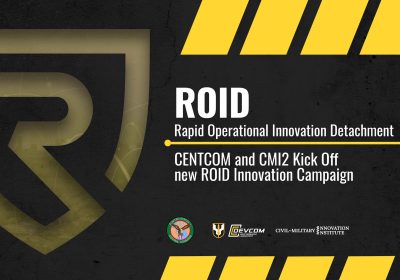Shepherd University is the most recent university to join the Army Pathfinder Program, an initiative overseen by the U.S. Army Combat Capabilities Development Command (DEVCOM) Army Research Laboratory (ARL) and executed by the Morgantown, WV-based Civil-Military Innovation Institute (CMI2).
Shepherd University is the eighth institution to join a prestigious group of Pathfinder universities nationwide, including four in West Virginia, that work with soldiers to innovate technology solutions to some of the most critical challenges confronting the Army via the Catalyst-Pathfinder program.
Catalyst-Pathfinder connects national research universities with operational forces to speed the transition of technologies from concept to development to the battlefield.
In late April, representatives from Shepherd and CMI2 held a kick-off meeting for the Routine Task Automation seed phase project, the first collaborative project.
The Routine Task Automation (RTA) problem set was curated from the Catalyst software platform, a QR code-based portal accessible to all Warfighters to provide their problem sets to be viewed and analyzed by a CMI2 Pathfinder Warfighter Innovation Chief (PWIC) for problem curation and solutioning options.
Human error within the repetitive supply inventory process in the Army—spending dozens upon dozens of man-hours on every drill for National Guard units—is a challenge.
CPT Hunter Gronlund of the 922nd Engineer Detachment with the West Virginia Army National Guard recognized the opportunity to refine the process to increase the unit’s efficiency.
“We have very intelligent individuals within our ranks who want to contribute in a meaningful way, and [Catalyst-Pathfinder] provides them with a pathway to do so,” Gronlund said. “We must empower our Soldiers and Airmen to be problem solvers, and this gives us that capability. The opportunity to collaborate on solutions is necessary.”
Upon submission, the problem was evaluated and researched with representatives of DEVCOM, the U.S. Army Tank-automotive and Armaments Command (TACOM), and the 82 Airborne Division to evaluate and explore the problem statement and determine opportunities to integrate with existing solutions.
The PWIC for the West Virginia region, Mallory Coleman, then contacted Dr. George Ray, Assistant Professor of Business at Shepherd University, with additional research areas in Unmanned Aerial Vehicles (UAVs) and data analytics, for assistance.
“Shepherd University looks forward to building a relationship with the Army and assisting CMI2 with its important work,” said Dr. Ray. “It’s an honor for my co-principal investigator, Dr. Jim Elmore, and I to be working on improving U.S. Army effectiveness through innovation and refining operational processes by identifying and streamlining bottlenecks to improve efficiencies.”
The Army’s Catalyst-Pathfinder program, launched in 2021, is focused on resolving Soldier-identified issues at the lowest levels. The primary goal is to integrate academia or industry solutions into DoD and into the hands of the Soldiers who identified those problems to begin with.
CMI2 boasts a nationally distributed team of PWICs embedded in five different regions (both active duty force and National Guard-focused) to receive problems from various Army components and support issue resolution.




